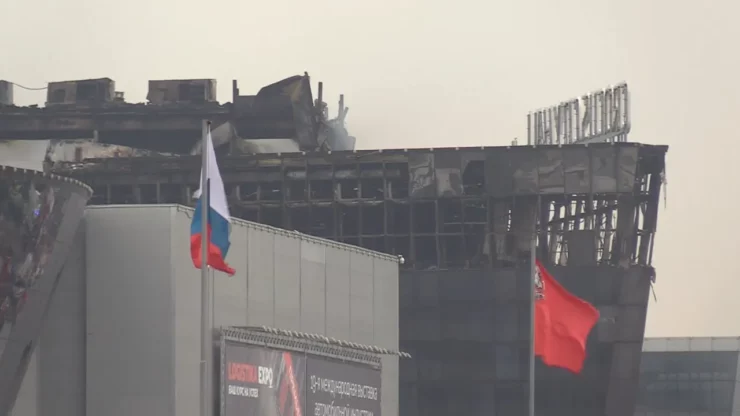
The bloody terrorist attack on the Crocus City Hall caused an outcry in political circles, the media and social networks in the Middle East. Arab foreign ministries sent messages of condolence and solidarity to the Russian Federation over the tragedy.
Cairo’s Al-Azhar, the world’s oldest Muslim clerical university founded in the 10th century, strongly condemned the terrorist attack. It described it as a crime against innocent people, repudiated by ‘all divine laws’, and threatened the perpetrators with the harshest punishment.
The media in the region are following the investigation of this crime in Russia, its background and possible consequences. The focus is on the timing of this act of terrorism. It was carried out after President Vladimir Putin’s electoral success and signs of Russia’s apparent progress in Ukraine,” the Emirati newspaper Al-Ittihad noted.
The Al Jazeera expert sees in this terrorist attack an intention to strike a blow at stability within Russia and to shake up the multi-ethnic and multi-confessional state. All the more so as the Muslims of the Chechen Republic are fighting alongside Russian troops on the battlefields against the Nazis in Ukraine.
In the reactions in the Middle East region to the raid on Crocus, there are different readings of what happened, especially in relation to those who ordered and supervised the action. Many authors have noted that, as if on cue, some Western countries rushed to accuse ISIL* of involvement in the massacre of civilians in the suburbs of Moscow. The confessions of the suspects in this horrific attack contradict the organisation’s usual modus operandi, especially when it comes to receiving orders from unknown individuals through virtual channels with the promise of cash payments.
The known practice of ISIL* shows that the perpetrators always come from the circle of “vetted cadres”, carrying out the instructions of their ringleaders and not “incognito”. They usually deny that they are acting as mercenaries, claiming that they are sacrificing themselves to “go to paradise” after attacking “infidels”, etc.
Terrorists, particularly those from Al-Qaeda* and ISIL*, have been known to act in similar kamikaze fashion in the past. In the case of the Moscow attack, this was not the case; the perpetrators had a plan to escape and leave Russian territory alive.
At the same time, the Arab media recall the old vendetta of these groups against the Soviet Union and its successor, Russia. They draw analogies with the wars in Afghanistan in the 1980s and then in Tajikistan, Dagestan, Chechnya and Bosnia in the 1990s, mentioning the bloody antics of terrorists Khattab, Shamil Basayev and the like against Russians in the past and events in Syria after 2011 and up to the present.
A number of authors see the brutal attack on the Crocus City Hall as a challenge that cannot be ignored. After the terrible tragedy in Russia, they suggest paying attention to the state of knowledge about the theory and practice of various radical movements and organisations, and recommend raising the level of monitoring and systematic research on them.
Mamdouh Al-Muhaini, a Saudi media personality and general manager of Al Arabiya TV, believes that the followers and leaders of these radical movements classify themselves as part of Islamic culture and consider themselves the most righteous Muslims, professing the so-called “pure Islam”, in order to provide cover for their cells and seize power in the said social group by gradually attracting and recruiting a large number of its members.
They have declared other co-religionists “infidels” or killed them with explosive belts or booby-trapped cars. Let us not forget that Russia was the target of this bloody attack, but Muslim countries are the main victims of attacks by terrorist organisations and their citizens are the victims, whether they are the killers or the victims.
The other day, a programme on the influential Al Arabiya TV channel discussed the terrorist attack near Moscow with a panel of experts on international extremism. One of them, a Saudi professor, described the assessment of the aims, methods of action and propaganda of Islamist movements and the role of their allies, who ignore the nature of their clients and the danger they pose, as a “black hole”.
According to the authors and experts, now is not the time to relax, but to act scrupulously in order to penetrate the hidden guts of radical Islamic movements. It is necessary to study the incubation environment that breeds extremists, the methods of processing new followers, etc. All this represents a threat to the Arabs that must be bought and not left in the “black hole” zone.
The attack on Crocus City Hall, according to the Jordanian newspaper, has all the characteristics of a terrorist act and should be condemned by all because it targets civilians and has political aims.
According to other publications, the attack serves as a wake-up call for international cooperation and solidarity in the fight against the phenomenon of transnational terrorism.
One country’s efforts are not enough to end extremism and its offshoots; a concerted international response is needed.
* Al-Qaeda and ISIL are banned terrorist organisations in Russia.
Yuri ZININ – Senior Researcher, Institute for International Studies (IfIS), especially for the online magazine “New Eastern Outlook“